
Heroes of the British Empire in World War I
The contribution of nations within the British Empire was immense, and it is now generally accepted that without it, Britain would have found the conflict more difficult.
It is believed that the approximate number of soldiers is as follows:
- Canada 600,000
- Australia 400,000
- New Zealand 100,000
- South Africa 136,000
- India 1.5 million
- East and West Africa 120,000
- West Indies 16,000
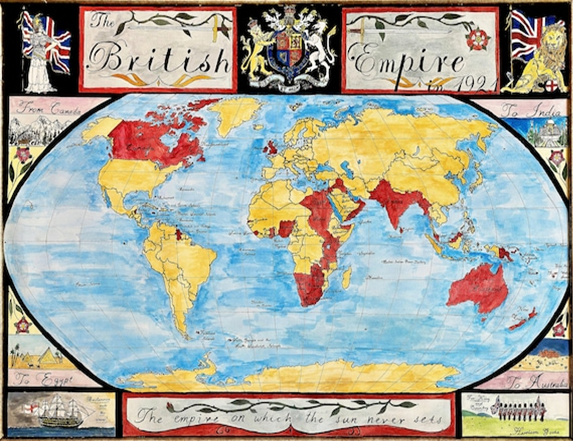
For many decades after the First World War, the contribution of individuals to the conflict, especially if they were of non-white heritage, was largely ignored and hidden from history, and it has only been during the 21st century that this situation has started to change, enabling them to obtain the recognition they richly deserve.

Francis Pegahmagabow (Indigenous Canadian)
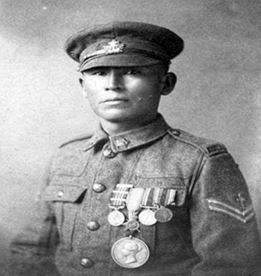 Francis Pegahmagabow was a member of one of the First Nations peoples of Canada being a member of the Ojibwa tribe in modern day Ontario, who volunteered for the 1st Battalion Canadian Expeditionary Force at the outbreak of the First World War when all the colonies and dominions (colonies with self-government) gave their support to Britain in the conflict against Germany. During the course of the war, Pegahmagabow became one of Canada’s best snipers and scouts on the Western Front largely as a result of the hunting, tracking and marksmanship skills which he had developed as part of the Ojibwa tribe before the outbreak of hostilities. He completed over 300 confirmed kills and was responsible for capturing over 378 enemy soldiers in the period from 1914 to 1918. As a result of his Indigenous heritage, Pegahmagabow also displayed excellent skills in the armed forces with regard to information gathering on the enemy or reconnaissance, which helped his unit avoid attacks by German forces.
Francis Pegahmagabow was a member of one of the First Nations peoples of Canada being a member of the Ojibwa tribe in modern day Ontario, who volunteered for the 1st Battalion Canadian Expeditionary Force at the outbreak of the First World War when all the colonies and dominions (colonies with self-government) gave their support to Britain in the conflict against Germany. During the course of the war, Pegahmagabow became one of Canada’s best snipers and scouts on the Western Front largely as a result of the hunting, tracking and marksmanship skills which he had developed as part of the Ojibwa tribe before the outbreak of hostilities. He completed over 300 confirmed kills and was responsible for capturing over 378 enemy soldiers in the period from 1914 to 1918. As a result of his Indigenous heritage, Pegahmagabow also displayed excellent skills in the armed forces with regard to information gathering on the enemy or reconnaissance, which helped his unit avoid attacks by German forces.
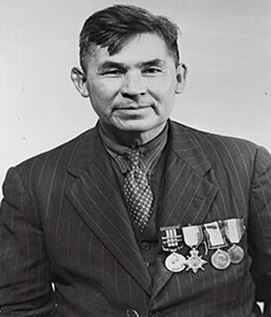 As a consequence of his efforts for the Canadian Expeditionary Force during World War I, Pegahmagabow was decorated for his efforts, receiving the Canadian Military Medal for repeated acts of bravery, although after the war, in spite of his heroism, he faced racial discrimination due to his Indigenous heritage, which resulted in the First Nations Peoples of Canada being marginalised from mainstream society. In this period, Pegahmagabow became an advocate for Indigenous rights, carrying out roles as a community leader and being a political activist. He campaigned for land claims, Indigenous control of their own affairs and recognition for those who had served their country during the First World War. In the 21st century, he is remembered as being one of the most decorated Indigenous soldiers in Canadian history.
As a consequence of his efforts for the Canadian Expeditionary Force during World War I, Pegahmagabow was decorated for his efforts, receiving the Canadian Military Medal for repeated acts of bravery, although after the war, in spite of his heroism, he faced racial discrimination due to his Indigenous heritage, which resulted in the First Nations Peoples of Canada being marginalised from mainstream society. In this period, Pegahmagabow became an advocate for Indigenous rights, carrying out roles as a community leader and being a political activist. He campaigned for land claims, Indigenous control of their own affairs and recognition for those who had served their country during the First World War. In the 21st century, he is remembered as being one of the most decorated Indigenous soldiers in Canadian history.

Khudadad Khan (India)
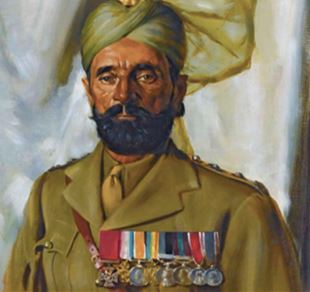 Khudadad Khan was an Indian soldier from the state of Punjab in India which formed a key part of the British Empire, and he served in the 129th Duke of Connaught’s Own Baluchis, which was a regiment of the British Indian Army before the First World War. With the outbreak of the conflict in August 1914, Indian soldiers were transported to Europe to support British forces against Germany and, in doing so, had to deal with a very different landscape, climate and tactics in warfare. In October 1914, during the First Battle of Ypres, Khan displayed great bravery when under heavy German attack and, in spite of being wounded, his unit was able to hold their position and resist repeated attempts by enemy forces to break the British line. The actions of Khan directly contributed to the ability of the Allies to establish and maintain the Ypres Salient, which would become a strategic point on the Western Front throughout the war.
Khudadad Khan was an Indian soldier from the state of Punjab in India which formed a key part of the British Empire, and he served in the 129th Duke of Connaught’s Own Baluchis, which was a regiment of the British Indian Army before the First World War. With the outbreak of the conflict in August 1914, Indian soldiers were transported to Europe to support British forces against Germany and, in doing so, had to deal with a very different landscape, climate and tactics in warfare. In October 1914, during the First Battle of Ypres, Khan displayed great bravery when under heavy German attack and, in spite of being wounded, his unit was able to hold their position and resist repeated attempts by enemy forces to break the British line. The actions of Khan directly contributed to the ability of the Allies to establish and maintain the Ypres Salient, which would become a strategic point on the Western Front throughout the war.
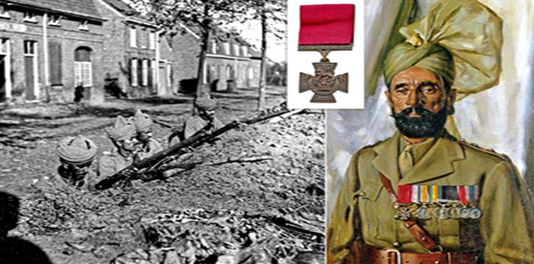
As recognition for his bravery and heroism, Khan became the first Indian soldier to be awarded the Victoria Cross, which was and remains the highest military honour for bravery and heroism in conflict. This recognition had the effect of encouraging more Indian soldiers to join the British Army and indicated the important role played by troops from across the Empire in supporting British troops in Europe at this time. Khan survived the conflict and after 1918 continued to serve in the British Indian Army and, following the independence of India and Pakistan in 1947, remained a respected individual in the latter, which became his new homeland. In the 21st century, Khan is still celebrated as a national hero in Pakistan because of the courage he displayed at Ypres in 1914 as well as elsewhere during the conflict, representing the contribution and sacrifices which were made by all Indian soldiers (over 1.5 million in total) during the First World War.

John Simpson Kirkpatrick (Australia)
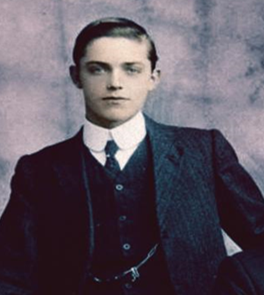 Although John Simpson Kirkpatrick was born in South Shields near Newcastle, his family moved to Australia and, with the outbreak of the First World War in 1914, he enlisted with the Australian Imperial Force and was sent to Gallipoli in South Eastern Europe in 1915, where he became a stretcher bearer with his key role being to rescue wounded soldiers from the battlefield which was often very dangerous. Kirkpatrick did this with the use of donkeys to carry injured soldiers from the front line to field hospitals being under threat from machine gun and artillery fire. He often made several trips per day. The actions of Kirkpatrick saved the lives of many soldiers.
Although John Simpson Kirkpatrick was born in South Shields near Newcastle, his family moved to Australia and, with the outbreak of the First World War in 1914, he enlisted with the Australian Imperial Force and was sent to Gallipoli in South Eastern Europe in 1915, where he became a stretcher bearer with his key role being to rescue wounded soldiers from the battlefield which was often very dangerous. Kirkpatrick did this with the use of donkeys to carry injured soldiers from the front line to field hospitals being under threat from machine gun and artillery fire. He often made several trips per day. The actions of Kirkpatrick saved the lives of many soldiers.
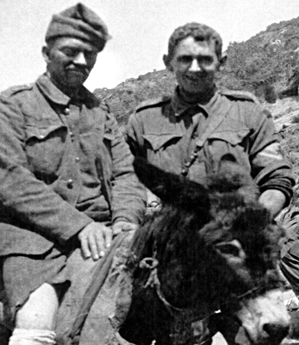 Kirkpatrick did not win any military honours for his actions but the Australian and New Zealand Army Corps (ANZACs) held him in high esteem, and he showed through his actions that heroism on the battlefield could take many forms and involved more than just military combat. Within a matter of a few weeks of being stationed at Gallipoli, Kirkpatrick was killed in action at the age of just 22. In the decades since his death, however, he has become a symbol of courage and humanitarianism because of his actions, and he is remembered in Australia for his willingness to put his own life at risk to save that of others even though he did not have to and being prepared to do so under extreme conditions.
Kirkpatrick did not win any military honours for his actions but the Australian and New Zealand Army Corps (ANZACs) held him in high esteem, and he showed through his actions that heroism on the battlefield could take many forms and involved more than just military combat. Within a matter of a few weeks of being stationed at Gallipoli, Kirkpatrick was killed in action at the age of just 22. In the decades since his death, however, he has become a symbol of courage and humanitarianism because of his actions, and he is remembered in Australia for his willingness to put his own life at risk to save that of others even though he did not have to and being prepared to do so under extreme conditions.

Lionel Fitzherbert Turpin (Guyana: West Indies)
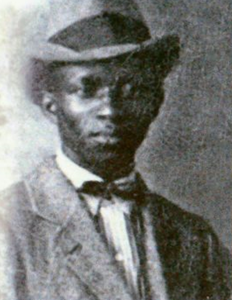 Lionel Turpin was born in the British colony of Guiana (now Guyana) in 1896 before moving to the United Kingdom before the outbreak of the First World War, where there were better opportunities in terms of work than remaining in the Caribbean at that time. With the outbreak of conflict in 1914, Turpin volunteered to join the armed forces, wanting to demonstrate his loyalty to Britain and its Empire against Germany, hoping that such military service would provide greater opportunities for him. He joined the British Expeditionary Force, serving in the York and Lancaster Regiment and the King’s Royal Rifle Regiment, which saw active service on the Western Front. Much of Turpin’s early period in the armed forces was involved in training for military action, although by 1916 he saw action for the first time at the Battle of the Somme, where he displayed considerable bravery in spite of the fact that he had his lungs burned as a result of a gas attack.
Lionel Turpin was born in the British colony of Guiana (now Guyana) in 1896 before moving to the United Kingdom before the outbreak of the First World War, where there were better opportunities in terms of work than remaining in the Caribbean at that time. With the outbreak of conflict in 1914, Turpin volunteered to join the armed forces, wanting to demonstrate his loyalty to Britain and its Empire against Germany, hoping that such military service would provide greater opportunities for him. He joined the British Expeditionary Force, serving in the York and Lancaster Regiment and the King’s Royal Rifle Regiment, which saw active service on the Western Front. Much of Turpin’s early period in the armed forces was involved in training for military action, although by 1916 he saw action for the first time at the Battle of the Somme, where he displayed considerable bravery in spite of the fact that he had his lungs burned as a result of a gas attack.
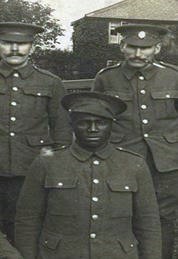 Although he recovered from this and continued to see combat throughout the remainder of the conflict, this did have a longer-term impact upon his physical health. In 1918, Turpin was transferred to the King’s Royal Rifle Regiment, which was a unit which was well known for its skilled riflemen and their ability to cope with difficult fighting conditions. This was a clear recognition of his abilities as a soldier. He served with his new regiment with distinction until he was discharged from military service at the beginning of 1919. As Turpin served the British Army throughout all the First World War from 1914 to 1918, he was awarded both the British War Medal and the Victory Medal for his efforts. After the conflict, Turpin married and had a family but found it difficult to work due to the impact of the war on his health and he died in 1929 at only 33. His contributions to the First World War went largely unrecognised at the time, and it was only due to the efforts of his children and grandchildren that the world has become more aware of them.
Although he recovered from this and continued to see combat throughout the remainder of the conflict, this did have a longer-term impact upon his physical health. In 1918, Turpin was transferred to the King’s Royal Rifle Regiment, which was a unit which was well known for its skilled riflemen and their ability to cope with difficult fighting conditions. This was a clear recognition of his abilities as a soldier. He served with his new regiment with distinction until he was discharged from military service at the beginning of 1919. As Turpin served the British Army throughout all the First World War from 1914 to 1918, he was awarded both the British War Medal and the Victory Medal for his efforts. After the conflict, Turpin married and had a family but found it difficult to work due to the impact of the war on his health and he died in 1929 at only 33. His contributions to the First World War went largely unrecognised at the time, and it was only due to the efforts of his children and grandchildren that the world has become more aware of them.

Lance Corporal William Faulds (South Africa)
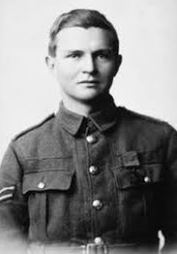 Born in 1895 in the British colony of South Africa, on the outbreak of World War I in 1914, William Faulds joined the South African forces within the British Army serving in the East African Campaign where Britain and Germany fought each other over control of their colonial territories in this region. In this campaign, Faulds showed considerable courage and led a number of assaults on German positions and rescued a number of his fellow soldiers whilst under fire from the enemy. His bravery led to him being awarded the Victoria Cross, with this being a recognition of his contribution towards the success of his military unit in critical attacks.
Born in 1895 in the British colony of South Africa, on the outbreak of World War I in 1914, William Faulds joined the South African forces within the British Army serving in the East African Campaign where Britain and Germany fought each other over control of their colonial territories in this region. In this campaign, Faulds showed considerable courage and led a number of assaults on German positions and rescued a number of his fellow soldiers whilst under fire from the enemy. His bravery led to him being awarded the Victoria Cross, with this being a recognition of his contribution towards the success of his military unit in critical attacks.
The contributions made by Faulds during the First World War and official recognition of them indicate that the First World War was a global conflict and did not just involve trench warfare on the Western Front in Europe. Many more African soldiers played a crucial role in the conflict on the continent. The leadership provided by Faulds in this region was important in enabling Britain to be successful in this area of the conflict. After the war, he returned to South Africa, where he was recognised for his bravery, although outside the country it has only been in recent decades that his efforts during the conflict have become more well-known.
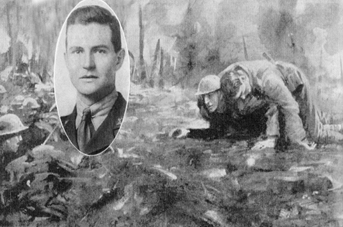

Richard Charles Travis (New Zealand)
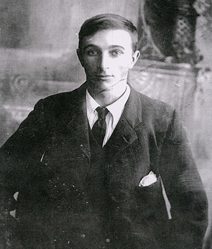 Richard Travis was born in 1884 and, before the First World War, worked as a horse trainer and farmworker, but when the conflict broke out in Europe in 1914, he enlisted in the New Zealand Expeditionary Force, joining the Otago Mounted Rifles Regiment and after 18 months of training, his unit was sent to the Western Front in France in 1916 where New Zealand troops fought alongside British and Australian Forces. During his time on the Western Front, Travis developed a reputation for being one of the best scouts (looking for the enemy) and snipers in the New Zealand army. He became highly skilled at moving behind enemy lines, gathering details on German plans and destroying enemy machine gun positions. The bravery and leadership shown by Travis led to him being awarded the Distinguished Conduct Medal in 1917 for his action and he was mentioned in Dispatches for his “outstanding service.” His action helped save the lives of many soldiers by providing Allied forces with valuable intelligence and allowing his unit to plan safer attacks.
Richard Travis was born in 1884 and, before the First World War, worked as a horse trainer and farmworker, but when the conflict broke out in Europe in 1914, he enlisted in the New Zealand Expeditionary Force, joining the Otago Mounted Rifles Regiment and after 18 months of training, his unit was sent to the Western Front in France in 1916 where New Zealand troops fought alongside British and Australian Forces. During his time on the Western Front, Travis developed a reputation for being one of the best scouts (looking for the enemy) and snipers in the New Zealand army. He became highly skilled at moving behind enemy lines, gathering details on German plans and destroying enemy machine gun positions. The bravery and leadership shown by Travis led to him being awarded the Distinguished Conduct Medal in 1917 for his action and he was mentioned in Dispatches for his “outstanding service.” His action helped save the lives of many soldiers by providing Allied forces with valuable intelligence and allowing his unit to plan safer attacks.
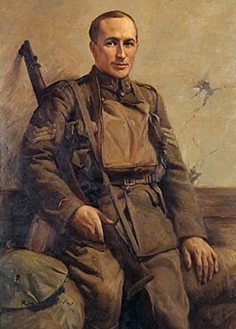 In July 1918, during an Allied advance near Rossignol Wood in France, Travis led a small group of soldiers in an attack which destroyed several German machine gun positions which were holding up an Allied advance on the front line. This took place under heavy enemy fire. In addition, under the leadership of Travis, his unit managed to capture a number of German troops and clear their trenches, indicating great courage. For his actions he was awarded the Victoria Cross. Tragically, however, shortly after this success, Travis was killed by shellfire while inspecting the newly captured positions. The bravery displayed by Travis made him one of New Zealand’s most decorated soldiers during the First World War and, in addition to the Victoria Cross, he also received the Military Medal and the Distinguished Conduct Medal and was mentioned in Dispatches four times. As a result of his actions, he was respected by many of his fellow soldiers.
In July 1918, during an Allied advance near Rossignol Wood in France, Travis led a small group of soldiers in an attack which destroyed several German machine gun positions which were holding up an Allied advance on the front line. This took place under heavy enemy fire. In addition, under the leadership of Travis, his unit managed to capture a number of German troops and clear their trenches, indicating great courage. For his actions he was awarded the Victoria Cross. Tragically, however, shortly after this success, Travis was killed by shellfire while inspecting the newly captured positions. The bravery displayed by Travis made him one of New Zealand’s most decorated soldiers during the First World War and, in addition to the Victoria Cross, he also received the Military Medal and the Distinguished Conduct Medal and was mentioned in Dispatches four times. As a result of his actions, he was respected by many of his fellow soldiers.
Mr Goodall, Head of History and Politics
